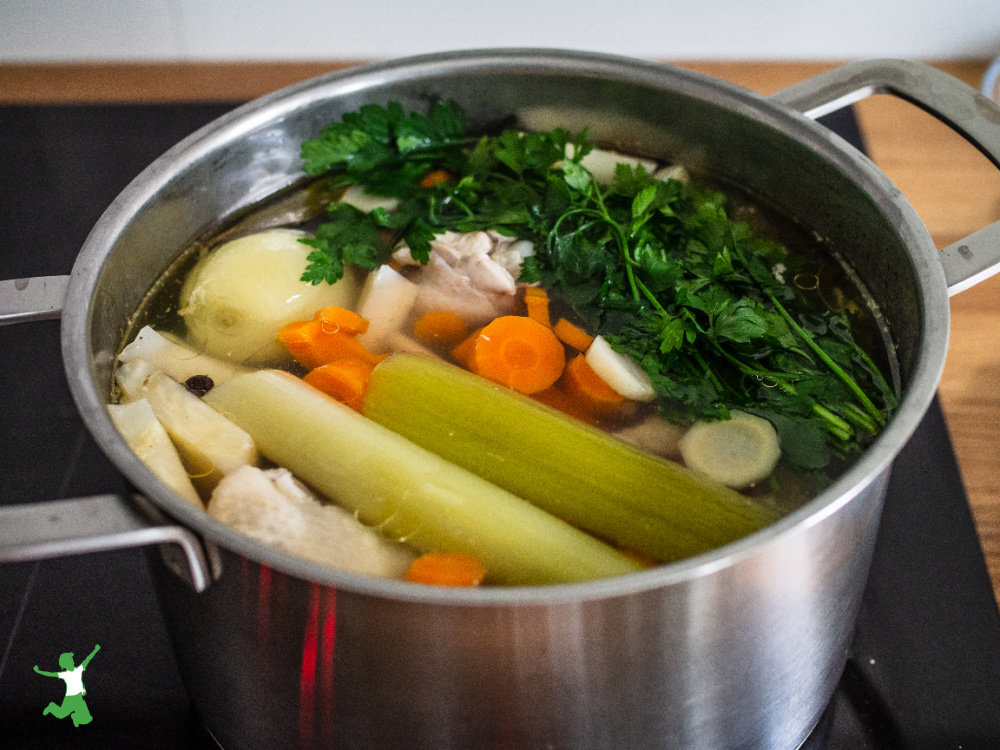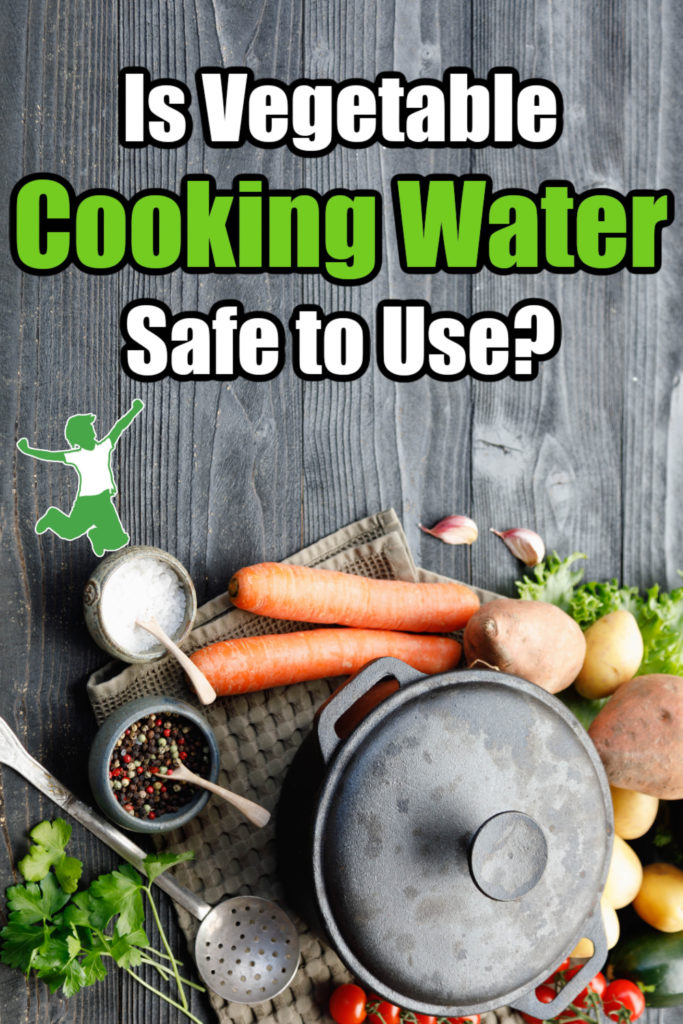Guidelines for when vegetable cooking water is safe to use and when it is best to toss due to nitrites, residues or anti-nutrients that can do more harm than good.

Adelle Davis popularized the practice of saving vegetable cooking water during the Leave it To Beaver era of the American 1950s.
She reasoned that any vitamins and minerals lost from cooking the vegetables would end up in the water.
This supposedly nutrient-rich cooking water could then be added to homemade soups or sauces with the nutrition benefiting those that consumed them.
This notion took hold and has not let go to this day.
Unfortunately, reserving vegetable cooking water can do more harm than good.
Consider the reasons below before you use it in your dishes. How to know your veggie cooking water is safe is discussed as well.
Chemical Residues
If the vegetables that are cooked are not organic, pesticides and nitrites from commercially produced fertilizers can end up in the cooking water.
Even low to no spray veggies such as asparagus would not be safe.
These crops are still typically fertilized with commercial preparations that are high in nitrites.
Anti-Nutrients
Cooking cruciferous vegetables such as broccoli, cauliflower, cabbage, Brussels sprouts, and kale would add goitrogenic (thyroid blocking) substances to the cooking water which should be discarded.
Water used to boil potatoes would contain chemicals called hemagglutinins that disrupt red blood cell formation.
Dark green, leafy vegetables such as beet greens, raw spinach, and chard contain oxalic acid that blocks calcium and iron absorption.
This irritating substance also can cause distress to the sensitive mucous membranes in the mouth and intestinal tract and contributes to the formation of kidney stones.
Consuming raw crucifers or dark, leafy greens is not an alternative either as the substances that cause problems when in the cooking water also cause problems if consumed directly with the vegetable in an uncooked state such as a raw green smoothie.
Legumes & Beans
For the last few years, the vegan community has popularized the trend of reusing legume cooking water, particularly from chickpeas.
This isn’t a safe practice even if the legumes or beans are soaked before cooking.
This soapy, slimy water is called aquafaba and is used as an egg replacement, particularly in dessert recipes. It whips up foamy just like egg whites.
Published research reveals that chickpea cooking water contains saponins, a potent anti-nutrient that contributes to leaky gut, which is at epidemic levels today.
It is also not advisable for pregnant women to consume this substance as it is a miscarriage risk.
Safe Vegetable Cooking Water
Do you really want to use vegetable cooking water as a frugal tool in your kitchen routine?
Consider this list of some of the most popular vegetables below. They are safe to use for that purpose.
- carrots
- turnips
- potatoes (peelings)
- parsnips
- beets
- celery
- organic pumpkins and squash (including zucchini)
- organic onions, leeks, and garlic
- nightshades (tomatoes, eggplant, and peppers among a few others)
For example, this potassium broth recipe uses vegetables simmered in water from the list above.
Simple Guidelines To Follow
Do you find it confusing to remember the distinctions between which organic veggies are safe to use and which are not?
Or, do you buy some veggies organic and others conventional?
If so, it is best to just adopt the practice of not using the cooking water at all.
This is particularly true if you tend to mix veggies together when cooking them.
Never Use Veggie Water for Baby Food
It is of particular importance NOT to use vegetable cooking water for use in pureeing homemade baby food.
Use pure filtered water instead, or if baby is old enough, some homemade bone broth or meat stock.
Final Caution to Consider
One final word of caution.
All vegetables tend to form nitrates after cooking and during storage. These nitrates can transform into strong carcinogens in the intestines.
Hence, it is best to avoid refrigerating and reheating vegetables, particularly leafy, green vegetables which concentrate nitrates when grown commercially.
References
Nourishing Traditions Cookbook









I do eat a lot of organic fresh green edible common bean leaves, but can I drink the dark chorophyll-laden water?
If the cooking water from vegetables is so bad, then we should not eat soup or stews because the vegetables are cooked in the liquid and it is all eaten. Otherwise, it would not be soup or stews. It would just be a pile of cooked vegetables.
The idea espoused in this article is simply not logical.
Yes, this is true and a very good point. However, you will notice that most stews and soups use veggies where the vegetable cooking water is fine to consume like carrots, celery etc. Many people do experience gastro symptoms when eating soups where the veggies like broccoli are cooked with the broth. The antinutrients are in there and cause issues. I am one of those people … I can’t eat kale soup for example unless the kale is cooked separately and the water discarded before adding the cooked kale to the broth.
Logical when you Cook vegetables you are actually boilings whatever is on the outside into the vegetables not out of theme, think about it
lol don’t feel bad. This article is being a bit paranoid and there is no evidence. I’m all for organic for environmental reasons but conventional food is safe to eat. If you feel uncomfortable, just peel whatever it is you’re eating. You can also avoid the most pesticide contaminated foods google “dirty dozen” pr check out the full list: ewg.org/foodnews/list.php
I don’t normally comment on these things, and I’m not the kind of doctor that specializes on nutrition, but I felt bad that you felt bad.
My paediatrician recommended giving cooking water of vegetables to my 5 month old. I already gave her boiling water of potatoes and broccoli and now I feel really bad. Do you have a scientific reference?
Hi Sarah, what do you mean “it is best to avoid refrigerating and reheating vegetables”? How do you suggest storing and cooking vegetables (specifically leafy greens) to prevent them from forming nitrates? Thanks for your help!
Sorry for the confusion .. it is best to not refrigerate already cooked veggies. Hope that helps.
I used to believe in this but refrain from doing so. You’re right that reserving vegetable cooking water can do more harm than good. Thank you sarah for this wonderful post.
Utter nonsense. The world has gone mad over these kind of things. It will do you no harm at all unless you drank 5 gallons a day.
Hey, amazing post! What do you think of using vegetable stock as fertilizer (the one bought at the store one mixes with boiling water)?
If consuming vegetable cooking water is unhealthy, why is soup healthy? When making soup raw vegetables are added to the pot.